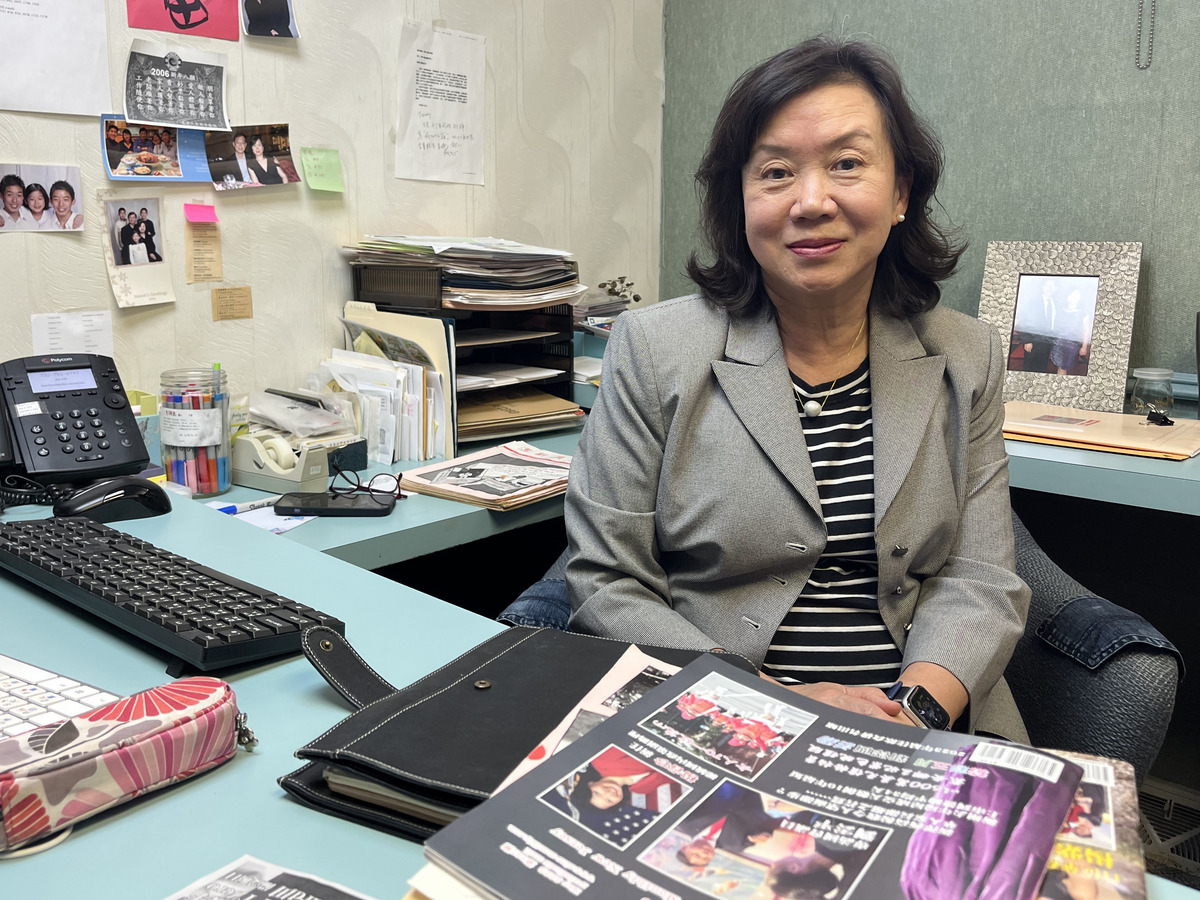
[ad_1]

Ivy Lee is the founder and editor of the impartial Chinese-language journal Sino Monthly. She likens it to take advantage of: “Milk has nutrition. It’s very inexpensive and very easy to get.”
Mary Yang/NPR
disguise caption
toggle caption
Mary Yang/NPR

Ivy Lee is the founder and editor of the impartial Chinese-language journal Sino Monthly. She likens it to take advantage of: “Milk has nutrition. It’s very inexpensive and very easy to get.”
Mary Yang/NPR
EDISON, N.J. – Bundles of free newspapers are stacked by the doorways of Chinese supermarkets in New Jersey. Plastered with brightly coloured advertisements, most are backed by highly effective establishments, be they spiritual teams, the religious motion Falun Gong or information businesses affiliated with the Chinese authorities in Beijing.
Sino Monthly, {a magazine} that prices $1.25 per challenge, stands out among the many Chinese-language press for one thing else: its independence. It was based by an area couple in 1991. They’re nonetheless on the helm.
“My magazine is like milk,” founder and editor Ivy Lee says when requested about how Sino Monthly has survived for therefore lengthy. “Milk has nutrition. It’s very inexpensive and very easy to get.”
Sino Monthly, with six individuals on the payroll, by no means aimed to be a paper of document. In reality, it’s one, having turn out to be a staple for New Jersey’s Chinese group.
“We tell the readers where the Chinese are”
Ethnic media retailers could be a lifeline for brand spanking new immigrants who lack a agency grasp of English. They introduce their readers to civic life in America and to one another. They will be particularly useful in locations like New Jersey, the place communities are unfold out fairly than concentrated in massive cities. In this state, ethnic media is rising, according to a new report by the Center for Cooperative Media at Montclair State University.
The first challenge Sino Monthly, at simply 16 pages, led with newly launched figures from the 1990 census. It counted 59,084 individuals dwelling in New Jersey who stated they have been Chinese. (That determine has since greater than doubled.)
“We tell the readers where the Chinese are,” says Lee.
Jennifer Lu, a yoga teacher who’s lived in New Jersey for almost 40 years, says she used to learn articles from Sino Monthly to her kids, now of their 20s and 30s.
“It’s a big help, especially to people who just moved to New Jersey or the United States,” says Lu. “There are still many elders who don’t know how to use computers, who still very much depend on the magazine.”
Sino Monthly is nonpartisan however Lee says a part of its mission is encouraging readers to take part within the politics of their new residence. The title of 1 October 1994 article forward of the midterm election learn, “拜托! 拜托! 投下您神圣的一票”
Translation: “Please, please cast your sacred vote.”
Today, the journal’s protection spans politics, the economic system and tradition. One current story profiled the White House deputy assistant on race and fairness, Jenny Yang, who grew up in New Jersey. Another shared the sweetness secrets and techniques of native ladies of their 70s.

Rutgers librarian Tao Yang maintains an archive of Sino Monthly points. They will assist future historians perceive New Jersey’s Chinese group, he says.
Mary Yang/NPR
disguise caption
toggle caption
Mary Yang/NPR

Rutgers librarian Tao Yang maintains an archive of Sino Monthly points. They will assist future historians perceive New Jersey’s Chinese group, he says.
Mary Yang/NPR
A document for future historians
Rutgers University Librarian Tao Yang maintains an archive of Sino Monthly points on three cabinets within the basement of the varsity’s East Asian Library. He says they function a document of New Jersey’s Chinese group, and can assist future historians perceive its development into one of many largest within the U.S.
“Not just the cultural issues or the political perspectives, but also the economic conditions,” Yang says. “Even advertisements are useful.”
He notes Lee’s introduction from 1991. It reads in Chinese: “Most of the time,mainstream mediadoesn’t have a lot of news about Chinese people. So the result is, if Chinese people have any issues, no one will know about it.”
“Chinese people don’t have access to mainstream media, and mainstream media doesn’t cover Chinese people,” the introduction continues.
“We still face the same problem today,” says Yang.
He says he incessantly spots copies of Sino Monthly in his associates’ properties when he visits them. But he worries that preservation will turn out to be a problem as an increasing number of information goes on-line, and bodily newspapers decay.
“That’s the issue with collecting newspapers and periodicals. They’re not supposed to last forever,” says Yang, pointing to the yellowed pages of the 1991 challenge.
Yang says preserving the unique print copies is vital, even when it looks as if every little thing will be discovered on-line. “I’m a little bit afraid the history – historical record of [the] Chinese community — will be lost again in the digital space,” he says.
Ethnic media thrives in print, researcher says
In addition to onerous copies, Sino Monthly now has an e-magazine and a presence on Facebook and WeChat.
“We have to keep pace with the world,” Lee says.
But, not like so many different information retailers, eliminating print magazines has by no means been a consideration.
“We still have many loyal readers,” she says. “The older readers, they’re still used to the paper magazine.”
Ethnic media retailers thrive on print, says Anthony Advincula, the lead creator of Montclair State University’s report.
“The insularity of ethnic media, in terms of their sustainability, helps them a lot,” says Advincula, describing a symbiotic relationship between the small information retailers and their advertisers.
Advertisers, usually readers themselves, discover in these pages a market of shoppers looking for service suppliers who communicate their language.
Those advertisements, from native companies comparable to actual property brokers and insurance coverage businesses, assist ethnic media retailers generate extra income from paper points than on-line, Advincula says.
“They know their market: ‘Let’s stay in our lane,'” he says. “And they’re okay.”
“I think the biggest challenge is right now”
Yet the way forward for Sino Monthly is way from sure. The pandemic made publishing and reaching readers more difficult, and Lee moved each of her publications — Sino Monthly and the ad-filled Chinese News Weekly — below the identical roof, closing the workplace that housed her weekly newspaper.
During the pandemic’s early months, Sino Monthly took benefit of the federal government monetary help provided to small companies.
“After the pandemic, you thought the economy would rise up. But actually not,” says Lee. “I think the biggest challenge is right now.”
Lee is now 63. Her husband retired from his full-time job in software program improvement a number of years in the past. They’re discussing what to do about Sino Monthly. Though she hasn’t discovered a successor but, Lee says she refuses to let her journal shut.
“My business started from ground zero,” says Lee. “So I know how to survive.”
[adinserter block=”4″]
[ad_2]
Source link




